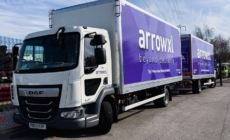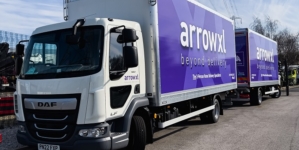-
ROSSLARE EUROPORT TARGETS HEALTH & SAFETY WITH CAMERA TELEMATICS PARTNERSHIP - 2 days ago
-
Landmark Study Reveals Wearable Robotics Significantly Boost Safety and Efficiency in Industrial Environments - July 24, 2024
-
Visku Tackle The Retail Seasonality Challenge One Pallet At A Time - July 22, 2024
-
KAMMAC AND BERGEN LOGISTICS STRENGTHEN FASHION & LIFESTYLE SERVICES IN THE UK - July 19, 2024
-
TENTBOX EXTENDS PARTNERSHIP WITH ARROWXL TO SUPPORT INCREASING DEMAND - July 17, 2024
-
The Perfume Shop improves customer journeys while driving profitability in partnership with Scurri - July 17, 2024
-
ZEROMISSION SECURES £2.3M ($3M) INVESTMENT TO ACCELERATE ELECTRIC FLEETS - July 16, 2024
-
BCMPA CELEBRATES SUCCESS OF 2024 CONFERENCE - July 15, 2024
-
Best of the Best: Jungheinrich Celebrates Triple International Award Win - July 12, 2024
-
GOPLASTICPALLETS.COM CALLS ON NEW CHANCELLOR RACHEL REEVES TO CONSIDER PLASTIC PACKAGING TAX REFORM - July 10, 2024
15% Less: Logistics Industry Commits To Ambitious Carbon Reduction Target By 2025.
The Freight Transport Association (FTA), the largest membership body in the UK logistics sector, has agreed to support a short-term government target of reducing carbon emissions from HGVs by 15%, announced today (9 July 2018) in the government’s Road to Zero report. The target will judge tailpipe emissions in 2025 against a 2015 baseline.
Commenting on the target, FTA’s Head of UK Policy Christopher Snelling said, “All sectors of society need to reduce their greenhouse gas emissions if we are to avoid the worst effects of climate change. HGVs and their operators have to play their part in this and significant steps have already been made by the industry to change its behaviours and impact on the environment.
“However, we think this target is challenging, given that, in reality, there are only seven years left to achieve it, but if the right things are done it can be delivered.
“The logistics sector will continue to work to make every efficiency in loading and routing, but if operators are to keep the UK supplied with the more than five million tonnes of goods that it needs every single day just to function, the government will have to support those responsible for moving goods by HGVs to enable them to facilitate the change without undue penalty.”
In its Road to Zero recommendations, the government has recognised that the logistics industry alone cannot be held responsible for reducing the nation’s emissions. The proposals include a series of additional measures to be pursued, including:
– Funding the Energy Savings Trust to develop a freight portal with advice for HGV operators, particularly smaller hauliers, on improving fuel and operational efficiency
– Working with road infrastructure bodies and the HGV sector to manage congestion and ensure freight can travel efficiently
– Continuing to support shifting freight from road to rail
– Developing a single agreed standard for an Ultra-Low Emission Truck (ULET), so manufacturers and buyers of lorries know what alternatively fuelled vehicles they should be purchasing, and central and local government know what they should support and encourage
– Pursuing regulatory opportunities to support the road freight sector in switching to lower emission commercial vehicles.
Commenting on the support from the government, Snelling says, “The logistics industry is ready and willing to reduce its emissions, but cannot operate in isolation – the other measures announced today are a welcome step on the road to zero. Very heavy units that need to be able to travel freely are the hardest thing on land to decarbonise, and the vast majority of operators of lorries are SMEs without the time or resource to create change on their own. Without the support of government to deliver these ambitious targets, the road to zero will be a very long and unattainable one for logistics operators.”
Helping industry play its part, it was also announced today that the industry’s Logistics Emission Reduction Scheme (LERS), which FTA provides free of charge to the whole industry to help operators reduce emissions, has adopted the Government’s target, building on its existing achievement of a 7% reduction in its members’ emissions by 2015 compared to 2010.
Efficient logistics is vital to keep Britain trading, directly having an impact on more than seven million people employed in the making, selling and moving of goods. With Brexit, new technology and other disruptive forces driving change in the way goods move across borders and through the supply chain, logistics has never been more important to UK plc. A champion and challenger, FTA speaks to Government with one voice on behalf of the whole sector, with members from the road, rail, sea and air industries, as well as the buyers of freight services such as retailers and manufacturers.
[tpr-boilerplate company=’52’]

































